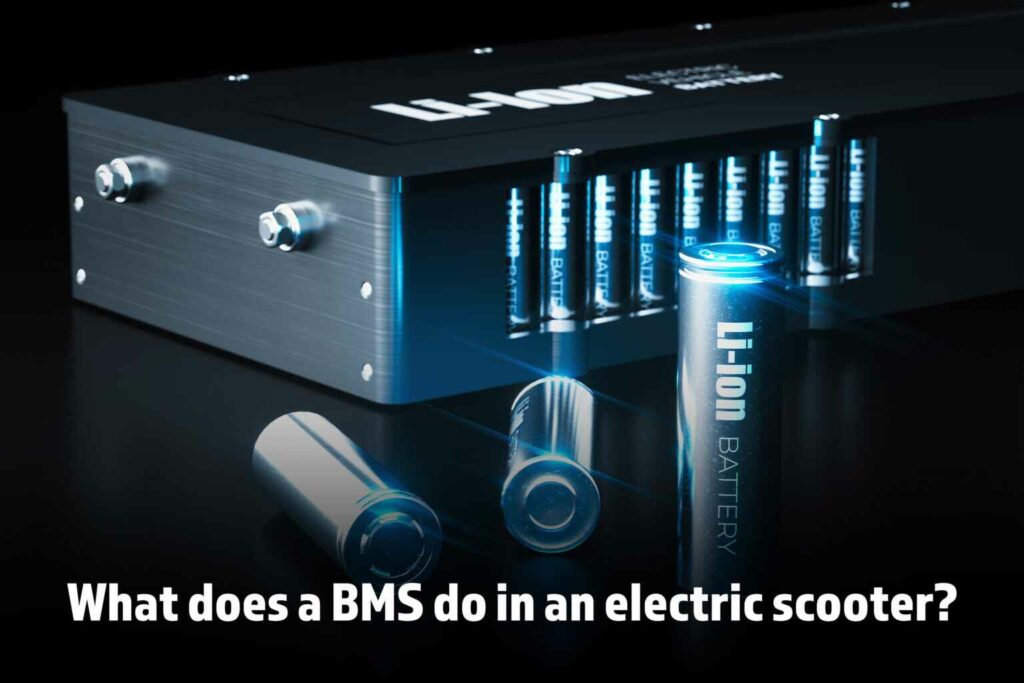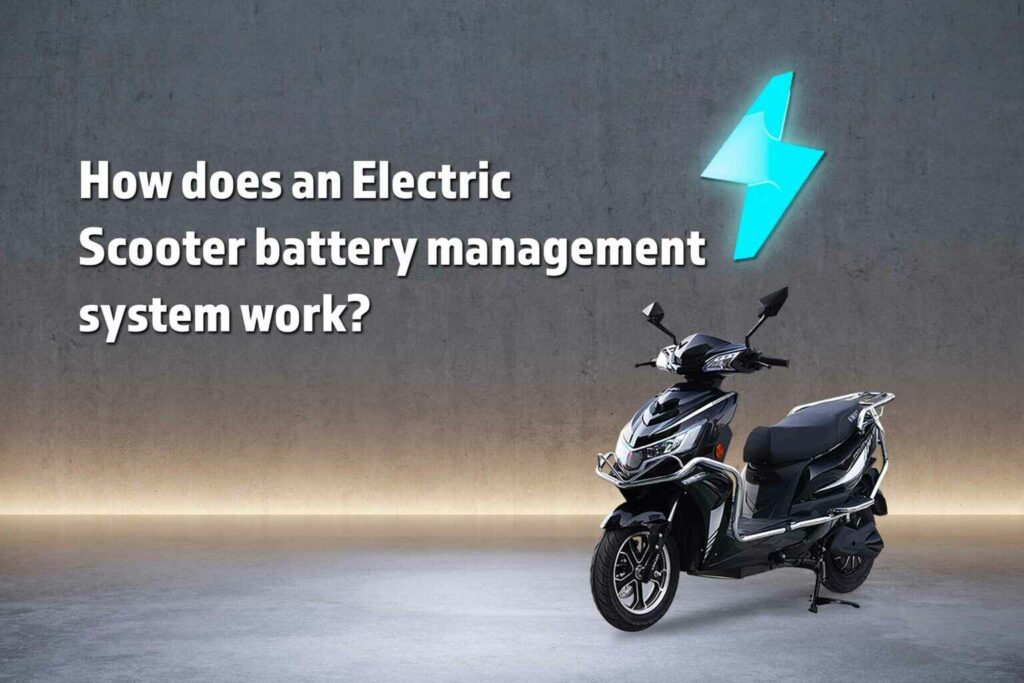The electric scooter battery management system plays a very important role when it comes to the performance and lifespan of the Electric bike. The battery management system is created out of sophisticated technology which not only ensures the safety of the battery but also the quality of the vehicle as well. We shall look into the various aspects of how the electric scooter battery management system works such as the need for it, its advantages, and the financial impact on the owner.
What is the need for a battery management system in electric scooters?
An Electric scooter battery plays a very important role in the proper functioning of the bike. However, without an effective battery management system, the performance of these batteries can be compromised. A battery management system serves as the brain of an electric scooter’s power system, ensuring the battery operates optimally at all times.
Battery health management
One of the core functions of a battery management system is to monitor the health of electric scooter batteries such as:
- Temperature
- Voltage
- Current
The Battery Management System helps in operating the battery within safe limits. It prevents the battery from overcharging, over-discharging, and overheating.
E-scooter power control
Electric scooters require precise power control to deliver a smooth and comfortable riding experience. The role of the E-Scooter power control is to manage the power flow between the battery and the motor.
Battery performance optimization
To extract the best performance from electric scooter batteries, a battery management system optimizes their functionality. It continuously analyzes the battery’s performance characteristics and adjusts the power distribution accordingly. By monitoring the battery’s state of charge and internal resistance, the BMS ensures consistent power output and efficient utilization of available energy.
Battery safety features
Safety is of utmost importance when it comes to electric scooters and the battery management system plays a major role in providing a safe riding experience.
- Role of BMS in Safety
- Short circuit protection
- Overcurrent protection,
- Temperature monitoring.
These safety mechanisms prevent accidents resulting from battery malfunction, thereby safeguarding the rider and the scooter itself.
Lithium-ion battery management
Most electric scooters employ lithium-ion batteries due to their high energy density and long lifespan. The BMS helps in controlling voltage levels and charging cycles. It also helps in operating the Lithum ion battery pack in a safe manner.
Smart charging systems
Electric scooter batteries require charging at regular intervals to maintain optimal performance. It monitors and adjusts the charging parameters based on the battery’s state of health and the level of charge required. This intelligent charging system extends battery life and minimizes energy waste, promoting energy efficiency in electric scooters.
Battery diagnostics
Accurate diagnostics are indispensable when it comes to electric scooter batteries. With the use of accurate information, users may prevent problems from arising later on and ensure that the battery in their electric scooter lasts a long time.
What Is the Need for an Electric Scooter Battery Management System?
Implementing an electric scooter battery management system brings numerous advantages, making it an indispensable component in electric scooters.
Enhanced battery performance and lifespan:
A BMS optimizes battery performance, resulting in improved efficiency and extended battery life.
- Efficient power utilization through precise power control.
- It prevents overcharging and over-discharging, prolonging the battery's lifespan.
- Monitors battery health, enabling proactive maintenance.
Safety assurance:
The BMS incorporates safety features that protect the battery and the rider from potential hazards.
- Prevents short circuits and limits overcurrent to ensure safe operation.
- Temperature monitoring safeguards against overheating risks.
Energy efficiency:
Electric scooter Battery management systems enable energy-efficient operation by intelligently managing charging and discharging cycles.
- Smart charging algorithms maximize energy utilization and minimize waste.
- Optimized power distribution enhances overall efficiency.
Diagnostic capabilities:
Comprehensive battery diagnostics provided by the BMS aid in identifying potential issues early on, allowing for timely maintenance and repair.
What is the Financial Impact of a Battery Management System?
While implementing a battery management system may incur additional costs initially, the financial impact in the long run can be significant.
Extended battery lifespan:
By preventing overcharging and discharging, a BMS helps to extend the battery’s lifespan. This reduces the need for frequent battery replacements, resulting in cost savings.
Enhanced energy efficiency:
Battery management systems optimize power distribution, minimizing energy waste. With lower energy consumption, the cost of charging the electric scooter decreases over time.
Reduced maintenance costs:
Prompt detection of battery issues through BMS diagnostics allows for timely maintenance and repair. By addressing problems early on, the need for costly battery replacements or major repairs can be minimized.
How do you maintain an electric scooter battery?
To ensure the longevity and optimal performance of an electric scooter battery, regular maintenance is essential. Here are some tips to maintain your electric scooter battery effectively:
Charge the battery regularly:
It is recommended to charge the battery after each use or at least once every few days, even if the scooter is not in use. This prevents battery depletion and keeps it ready for your next ride.
Avoid extreme temperatures:
Extreme heat or cold can adversely affect battery performance. Store your electric scooter in a cool, dry place, and avoid exposing it to extreme temperatures to prolong battery life.
Keep the battery clean:
Regularly clean the battery and its connections to remove any dust or debris that may interfere with its performance. Use a dry cloth or a gentle cleaning solution for this purpose.
Handle with care:
Avoid subjecting the battery to physical shocks or impacts, as this can damage its internal components. Handle the battery with care during maintenance and transportation.
Follow manufacturer guidelines:
Adhere to the manufacturer’s instructions and guidelines for battery care. This ensures that you are providing the necessary maintenance steps specific to your electric scooter’s battery.
What does a BMS do in an electric scooter?

A Battery Management System (BMS) performs various critical functions in an electric scooter, ensuring optimal battery performance and safety.
Monitors battery health:
The BMS constantly monitors the battery’s voltage, temperature, and other parameters to assess its health. This enables it to prevent potentially damaging conditions and optimize battery performance.
Controls power distribution:
The BMS manages the power flow between the battery and the motor, ensuring the efficient utilization of available energy. It takes into account the rider’s throttle input and the current speed to provide a smooth and controlled riding experience.
Protects against overcharging and over-discharging:
By regulating the charging and discharging processes, the BMS prevents the battery from overcharging, which can cause damage, or over-discharging, which can lead to performance degradation.
Incorporates safety features:
The BMS integrates safety mechanisms such as short circuit protection, overcurrent protection, and temperature monitoring. These features safeguard against potential risks and enhance the overall safety of the electric scooter.
Provides battery diagnostics:
Comprehensive diagnostics capability allows the BMS to detect and report any potential issues with the battery. This enables users to take proactive measures, preventing costly repairs or premature battery replacements.
How many hours does an electric scooter battery last?
A number of variables, including maintenance procedures, battery quality, and usage patterns, might affect how long an electric scooter battery lasts. An electric scooter’s battery can last two to four years on average. However, a number of variables, like the frequency and length of rides, charging routines, and general battery health management, may affect this estimate.
It’s critical to maintain the scooter properly, avoid overcharging and over-discharging, and keep it in an environment that will maximize the lifespan of the battery. Users can guarantee the longevity and optimum performance of their electric scooter batteries by following suggested rules and making use of a dependable battery management system.
In conclusion, the battery management system plays a vital role in ensuring the efficient operation, longevity, and safety of electric scooter batteries. By effectively managing power distribution, monitoring battery health, and incorporating safety features, the BMS enhances battery performance, promotes energy efficiency, and reduces maintenance costs. To enjoy the full potential of an electric scooter battery, it is essential to implement a reliable battery management system and adhere to recommended maintenance practices.



